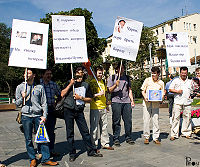Vladimir Yevgenyevich Churov
Vladimir Yevgenyevich Churov ( Russian Владимир Евгеньевич Чуров ; born March 17, 1953 in Leningrad ) is a Russian politician and since March 27, 2007 chairman of the Central Electoral Commission of the Russian Federation .
biography
Vladimir Churov graduated from the Faculty of Journalism in 1973 and graduated from the Faculty of Physics at the Leningrad State University in 1977 . From 1990 to 1993 he was a member of the Petersburg City Council. Then he took up a job in the city administration. Most recently he was head of the department for international relations. In this position he worked under the later President Vladimir Putin . In the elections to the State Duma on December 7, 2003 , Churov entered the list of the nationalist-populist Liberal Democratic Party of Russia and won a parliamentary mandate. In the State Duma he was in the following years Deputy Chairman of the Committee on Affairs of the Commonwealth of Independent States and Relations with Russians living abroad. On March 27, 2007, Vladimir Churov was elected chairman of the Central Electoral Commission of the Russian Federation. He is the author of several books on the history of the White Army , which in the Russian civil war against the Red Army of the Bolsheviks fought.
criticism
Critics accuse Churov of not being independent in his work as chairman of the electoral commission because of his previous collaboration with Vladimir Putin, and see himself confirmed by the course of the elections under his aegis. In an interview with the Kommersant newspaper in April 2007, he stated that it was "law" for him that Putin was always right. For his election as chairman of the election commission, a special rule had to be changed, as it was not previously intended that non-lawyers could take over this office. Tschurow also drew attention to himself with statements in which he described the post-election surveys customary in Western countries, in which voters were asked to go to the polling station about their voting decision and a prognosis is made on the basis of the data collected, as unreliable and claimed employees of polling institutes would manipulate such surveys. Critics suspect that by discrediting and preventing by-election surveys, situations like the one in Ukraine during the 2004 presidential election , where discrepancies between the results of independent by-election surveys and official election results, caused an uproar. Regarding criticism of the course of the elections, Churov himself said that he would cut his beard if the elections in Russia were not honest. Protesters then asked him to keep his promise (see picture).
Web links
Individual evidence
- ↑ Kommersant : "Разве Путин может быть неправ?"
- ↑ Boris Reitschuster : Putin's democrature. How the Kremlin taught the West fear. Berlin: Ullstein, 2007. pp. 68f.
- ↑ Komsomolskaja Pravda : Новый глава ЦИК рассказал "Комсомолке" о том, вправду ли он сбреет борсы
| personal data | |
|---|---|
| SURNAME | Tschurow, Vladimir Evgenyevich |
| ALTERNATIVE NAMES | Чуров, Владимир Евгеньевич (Russian) |
| BRIEF DESCRIPTION | Russian politician |
| DATE OF BIRTH | March 17, 1953 |
| PLACE OF BIRTH | Leningrad |

